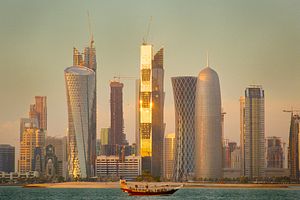At first look, the diplomatic crisis in the Gulf was more of an “in-house” conflict. Saudi Arabia, along with the United Arab Emirates, Egypt, Yemen, Libya’s eastern-based government, Bahrain, and the tiny South Asian Muslim state Maldives, imposed a land, sea, and air blockade on Qatar. The accusations against Qatar, which were very much focused on Gulf issues, included Qatar’s support for the Hamas group and the Muslim Brotherhood and good relationship with Riyadh’s archrival, Iran. Saudi Arabia claims that Doha was fostering various terrorist and sectarian groups.
Qatar denied all these claims and asked for dialogue. There was also a counter-reaction from Doha’s friends as well — Turkey and Iran immediately lent their hands to Qatar. Both countries intend to supply daily commodities and even indicated they would provide military support if needed. Turkey has already sent troops for a joint military drill.
Ultimately the fallout spread, and the Qatar-Gulf conflict is no longer an “in-house” issue. Countries around the world are marking out their positions.
U.S. President Donald Trump’s initial reaction was pro-Saudi but soon he turned back; the United States has now called for dialogue to end the impasse. Even Pakistan, Riyadh’s close friend and the only Muslim nuclear power, declined to stand against Doha — an interesting position, given that the Saudi-led joint military alliance is headed by a Pakistani general. Russia has also expressed concern over the crisis and made it clear that Moscow does not approve of the embargo against Doha. India said in a statement that actions taken by Riyadh and its allies will not hamper the relation between Doha and Delhi; the Indian government is concerned about Indian migrant workers in Qatar.
Bangladesh hasn’t announced an official stance on the crisis but the tensions have rocked the South Asian state. Bangladesh heavily depends on remittances from its four million expats all over the Gulf region; about 300,000 are currently in Qatar and around 3 million in Saudi Arabia. Currently, 29 percent of Bangladeshi remittances come from Saudi Arabia, but a major opportunity has been created in Qatar’s labor market due to the 2022 FIFA World Cup. The mega event demands massive amounts of construction work, which is being done by migrants from different nations, including Bangladesh.
Qatar said that the embargo has had no impact on the daily life of residents, but some Bangladeshi expats say otherwise. Food price are rising and availability is not guaranteed. Some Bangladeshi workers have also said that their authorities told them to return home, as their jobs are now uncertain.
Transit between Qatar and Bangladesh is more difficult now. As a result of the air embargo, Saudi Arabian Airlines, Emirates, Etihad, Air Arabia, Fly Dubai and Gulf Air suspended all their flights from Dhaka to Doha for an indefinite period. However, Qatar Airlines and Biman Bangladesh Airlines flights between Dhaka-Doha continue.
Bangladesh has historically kept good relations with Qatar and Saudi Arabia. Qatar has good reserve of natural gas and it had a contract to supply LNG to Bangladesh. Doha also has very good diplomatic tie with Dhaka, which has previously built schools, orphanages, and training centers in Bangladesh. In May, Qatar’s prime minister sent an invitation for the Bangladesh prime minister to visit Doha and expressed interest in helping solve the Rohingya issue.
On the other hand, Saudi Arabia has long had significant relation with Bangladesh. Bangladesh sent solders to Saudi Arabia during the first Gulf War.
Professor Tareque Shamsur Rehman, a scholar on international affairs, told the media that it would be difficult for Bangladesh to avoid Saudi Arabian pressure, as the nation is part of Saudi-led military alliance. “It would be better for Bangladesh to take measures carefully if the crisis lingers,” he said. Rehman noted that Bangladesh has to keep in mind three issues when formulating its response – laborers abroad, economic cooperation, and fuel imports from the Middle East.
“Bangladesh will keep its distance from this crisis, according to diplomatic analyses,” former Ambassador Abdul Momen Chowdhury has said to the media. “We will not put fuel in to the fire,” he added.
Journalists in Dhaka asked the foreign minister about the issue but he declined to comment beyond saying that government acknowledges the issue. It indicates that Bangladesh’s policy may be to keep silent and maintain its distance for now. The question is how long will this be possible?
Shakil Bin Mushtaq is a Bangladeshi journalist.

































